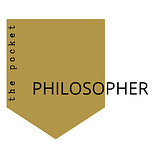Good morning friends,
I hope you’ve had a wonderful weekend and are feeling rested and energized for the week ahead.
And actually, that’s kind of where I’m hoping to go—doing some practical work and applied philosophy about the things we do, and don’t do, on a weekly basis. Things like breathing, eating, sleeping, working, stress, action, and waiting.
Today’s format will be unusual in that it will be unstructured and simply a set-up for the series we’ll be opening tomorrow.
I hope it’s ok, but I’ll also be doing some rare editorializing, and sharing a bit of my own philosophical reflections before returning to the study of others tomorrow. My hope is that you’ll join in me the comments and we’ll have a great conversation to start off the week!
Here we go…

Oftentimes, philosophy can feel like an academic discipline stuck in the clouds, reserved for a few and irrelevant to the masses. But truly, the intent of all philosophy is to understand life, and in that way we are each a philosopher working out our own story and purpose day in and day out.
Philosophers used to set themselves to knowing everything—to understanding a finite set of facts and relationships to gain wisdom. Today, philosophers (and that includes you!) are seeking the real wisdom that withstands the test of time. This wisdom is a carefully constructed worldview that allows us to understand anything new we might encounter. This worldview must be robust, tested, and inclusive.
And more than anything, that is what we are doing here at TPP.
And so to aid in this process as well as the advancement of our ultimate goal to increase our compassion and empathy, this week we’re going to start a two part series that will last until next Friday.
Some might call this two week discussion a conversation about epistemology (a.k.a theories of knowledge.) Others might incorporate it into a conversation about the Philosophy of the Mind or Consciousness. And yet others might label it as a reflection on the Philosophy of Science, analyzing ideas that most often discussed as rote facts or data.
Most of what we’ll be discussing has come from a reflection that writing this daily newsletter has sparked within me. I have noticed how much emphasis the larger philosophical tradition places on thinking. And, on the flip side, how little attention is given to the intuitive and non-linguistic wisdom of our bodies or deeper selves.
I’ve been utterly enamored by the complexity and sensitivity of our limbic systems, our circulatory and respiratory systems, the automatic work that keeps us healthy during sleep, and the genius that unconsciously strikes in the mundane rituals of every day life.
There is so much more intelligence within us than our ability to have controlled thoughts.
I’m developing a theory that there are really 3 types of thought. First, there is the kind we might most resonate with: controlled thought. This is most akin to problem solving or deep thinking. This is a response to a stimulus like a problem, question, or obstacle.
Next, there are the uncontrolled thoughts that fly around our lives without clear purpose, relevance, or helpfulness. It’s the constant judging, narration, and even random ideas that incessantly flood our internal reality.
Third, there is awareness. And this awareness is best when tuned to what is—and more specifically, what is happening inside of us.
Finally, I believe that really there are two types of awareness that we can access—the awareness of the active aspects of our lives, and the awareness of the passive.
The active aspects would be things like work, problem sets, relationships, or cooking while the passive would be the automatic wisdom that keeps us breathing, recuperating, our hearts beating, and our minds alert.
For the rest of this week, we’ll be considering the wisdom of “non-doing.” This will largely be a tip of that hat to Taoism, and its famous principle Wu-Wei.
Wu-Wei is a tough concept to analyze in a modern, post-industrial space, but it can best be understood as the wisdom, achievement, and lifestyle that comes from living spontaneously with a deep trust in the world, one’s path, and the timing of life’s events.
It’s a life lived with a lot of “slack” where we have space to examine all that is happening without our (largely compulsive, addictive) thinking getting in the way.
And then we’ll pivot with that foundation to consider thought as it relates to that which we do actively—working, problem-solving, making connections, and predicting. What happens in us when we are under stress, or struggling with a person or complex issue?
Together, I hope that we’ll survey a new category of philosophers and traditions, gain new gratitude for the genius that each of us has access to, and find new peace in the amount of intelligence we possess if we are just aware enough to notice it.
I’m excited to walk this journey with you, and even more excited to hear your thoughts! What do you think of the framework, about the 3 types of thought, about awareness, any of it, I want to hear from you!
Until tomorrow friends,
Matt
PS, make sure to share this with any friends that you think will enjoy this conversation and want to participate.














Share this post